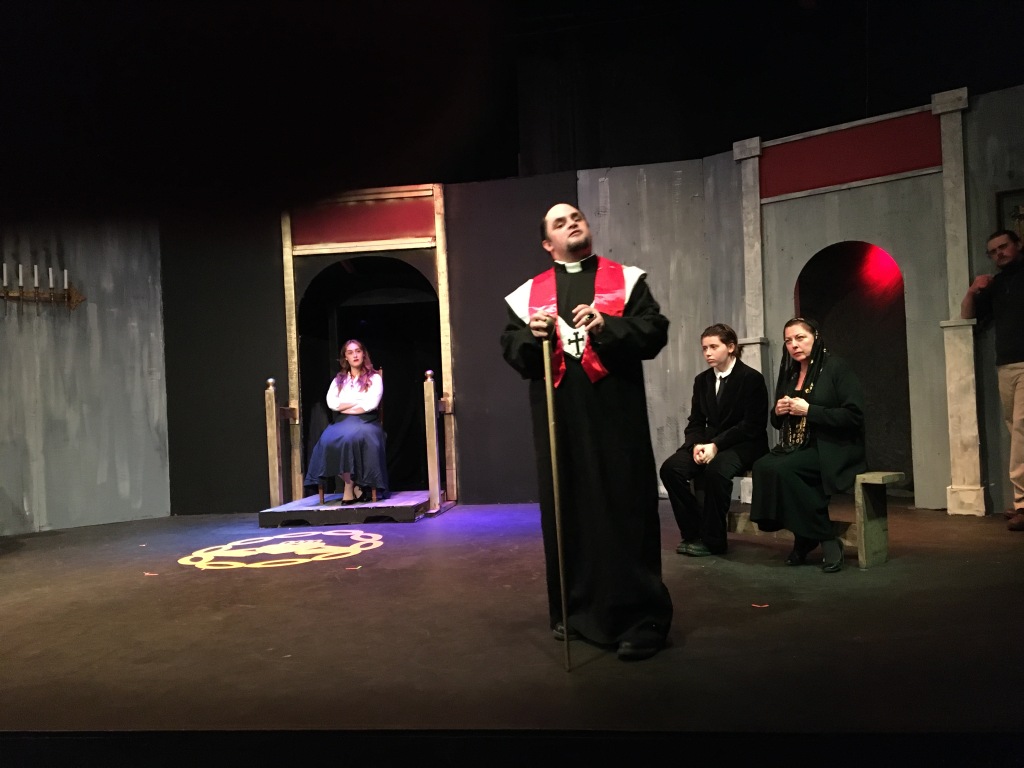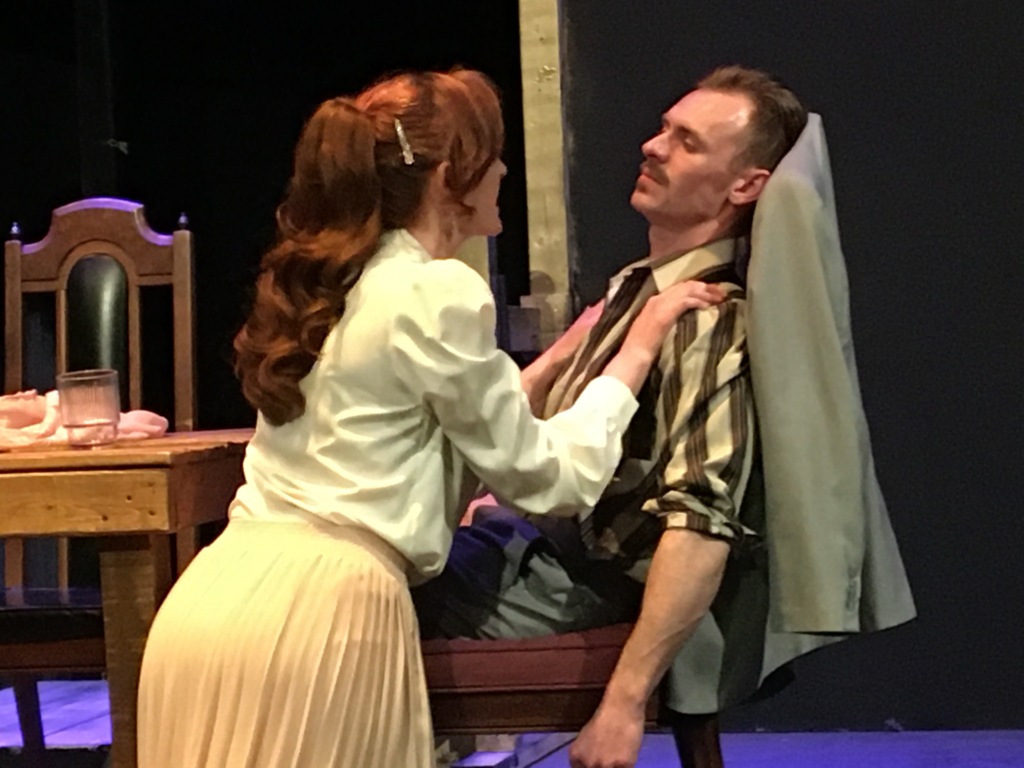By Benjamin Joe

Ian Michalski plays Monticelso, the evil cardinal who condemns Vittoria as Giovanni (Connor Snodgrass) and Cornelia (Stephanie Bax) sit, left to right. Photo Credit: Benjamin Joe
The White Devil hits the stage at the American Repertory Theater of Western New York on Thursday, April 11.
The author of this adaptation of the tragedy by John Webster, Charlie McGregor, also the co-director of the performance, said that he had come upon the work while studying abroad. He picked out “the whore” speech from it and started using it in auditions.
“If you don’t know ‘the whore’ speech you’ll know it when you see it,” he said.
McGregor also noted that “a lot of fluff” had been taken out of the play to make it more palatable for the audience. The original script is over 400-years old.
“Sometimes in plays back then there tended to be too much exposition and not getting to the point. Our attention span, over the years, has gone down and I think that we’re used to ping-pong conversation now,” he said.
For the sake of time (the original script is about five hours long) six characters were cut out of the play, and the ending has been adapted. Still there is plenty here that modern and classical audiences alike can appreciate.
Speaking to co-director Ari Lasting, she talked of the way women were presented in this adaptation of The White Devil.
“Victoria is already a strong character,” she said. “So it’s finding more moments to give her that autonomy in a world where she had negative autonomy. Finding and creating even more moments to give her that autonomy and independence in a world that was trying to keep that away from her was super fun.
“But something we created out of nothing was the character of Isabella who really, for lack of a better term, in the original script didn’t really exist. Was kind of one note.”
The White Devil’s plot is somewhat convoluted, as McGregor stated. A murderous row of circumstances envelope these characters with lust and power being the two linchpins upon which the audience’s fascination is poured upon.
First there is Vittoria, played by Heather Casseri, a young woman of a noble but poor house, married to a drunkard, Camillo, fabulously played by Justin Pope, and who’s sibling, Flamineo, played expertly by Andrew Zuccari, seeks higher station for himself. Their mother, Cornelia, bemoaning her children, is played by Stephanie Bax.
Through Flamineo’s encouragement, Duke Brachiano, played in emotional heights by Johnny Barden, pursues Vittoria, and rages against his own wife, Isabella, played by Camilla Maxwell — also emotionally brilliant — who has returned to Rome with their son, Giovanni, played by Connor Snodgrass.

Camilla Maxwell, playing Isabella, next to Johnny Barden, playing Brachiano. Photo Credit: Benjamin Joe
The stage is set for infamy, but the aforesaid relevancy of this new adaptation shines through.
“A couple of the additional scenes we created were centered around (Isabella) to give her a little more background. She has the first scene with Lodovico (played by Steven Maiseke). We gave her a little more background with him and that relationship. We gave her a little more background with her son to flush out that relationship and show that she really had the hand in raising this boy and making him the moral leader he became at the end of the play,” Lasting said.
“(Camilla) portrays it so well with such a gravitas and strength to her. (It was great) finding those moments where we could take another woman who is told what to do and where to go and who to marry and who to not be married to, and give her that (determination that), ‘this is my choice and this is my life and I can do what I want!’ That whole ‘ode to be a man’ speech that Camilla does so well?
“I think that really reflects on what we were trying to do in this play.”
That question of autonomy, independence, continues throughout the production. Ian Michalski plays Monticelso, the cardinal, lashing out his list of judgements against Vittoria, finally condemning her to a convent of “penitent whores” as masterfully as any right wing bigot can on YouTube.
“Ian’s character was definitely a tricky one with the original text. He’s this evil character and he has these moments of evil, these moments of ‘you should be beholden’,” Lasting said. “I think it’s a tough juxtaposition and think Ian’s navigating it very well.
“The text is super difficult for that character and making sure that throughline of that he’s not a good guy and puppet mastering does come through.”
Other pieces of the story come together in the second act of the play as the characters, especially that of Francisco, played by David Wysocki, Isabella’s brother, as he wrestles with letting his loss lie, or seeking revenge.
“The story I’m trying to tell is that faith can be a little tricky,” McGregor said. “We tend to begin our lives in faith whether it be some kind of religion or some kind spirituality and we turn to it in times of joy, desperation, anger, solace and sometimes these ideas of the seven deadly sins and ideas of selfishness and stubbornness come through us and affect us. Sometimes we have obstacles in life that are either self-inflicted or come from a test of faith or circumstance.
“And I notice that when people are at their lowest point, or highest point, they turn to faith in some sort of way. I think this play brings a lot of challenges, but each character has to play with this idea of the battle of revenge versus mortality.
“Is the satisfaction of the revenge — the death of your sister, your loved one — is everything that costs you that revenge worth it? Or is it the harshness of morality and doing what’s right and justice (the best course)? Because a lot of the times the easy thing is the wrong decision and the right decision, the just decision, is always the most arduous decision. I hope people reflect after the show and say in their own live, ‘how petty do I need to be in order to get my fill of life? Or should I look to the high road?’”
Still, the brightest point of this play is not that of a contemporary of Shakespeare, written only 150 years after the Bard’s advent, and still playing with the ideas of human vice and hubris when it’s clear to the audience that forces of emotion are the strong river that dictates the outcomes. Instead it is a very relevant look at today’s battle with equality, specifically between men and women and how they are supposed to act.
“There’s no whore in this play,” McGregor said. “It’s a woman who finds a better love. Someone who connects with her more. Someone that can give her what she wants more.
“And back then, and even in the 50’s, 60’s, 70’s and even today sometimes, there’s this disgusting look at women, who are trying to find what they want. Being honest and open and free without men being misogynistic, men sexualizing women, men not taking women seriously for standing their ground and pushing their power like they deserve, so this is an awesome place to showcase some of those things as well.”
More information about the performance can be found at artofwny.org.
